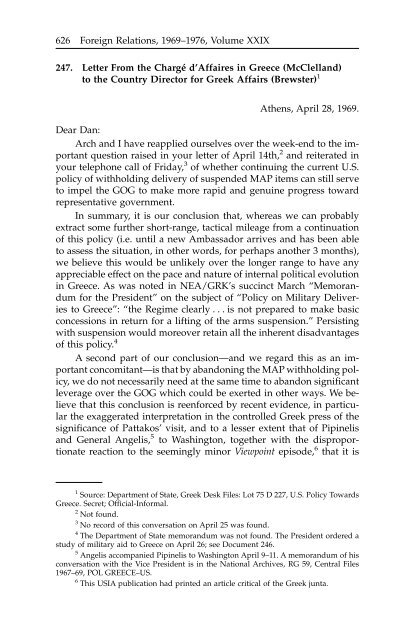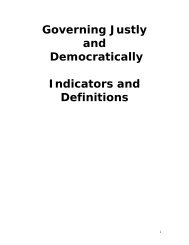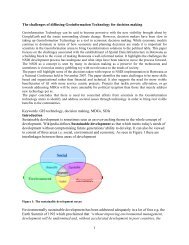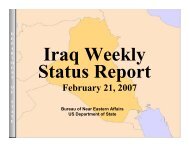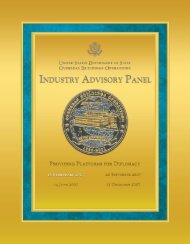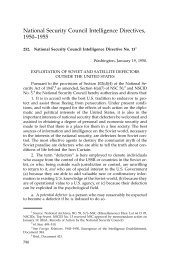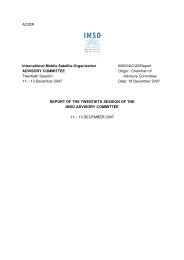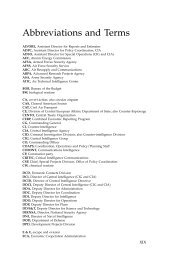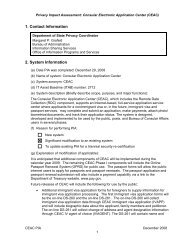Greece - US Department of State
Greece - US Department of State
Greece - US Department of State
Create successful ePaper yourself
Turn your PDF publications into a flip-book with our unique Google optimized e-Paper software.
626 Foreign Relations, 1969–1976, Volume XXIX<br />
247. Letter From the Chargé d’Affaires in <strong>Greece</strong> (McClelland)<br />
to the Country Director for Greek Affairs (Brewster) 1<br />
Athens, April 28, 1969.<br />
Dear Dan:<br />
Arch and I have reapplied ourselves over the week-end to the important<br />
question raised in your letter <strong>of</strong> April 14th, 2 and reiterated in<br />
your telephone call <strong>of</strong> Friday, 3 <strong>of</strong> whether continuing the current U.S.<br />
policy <strong>of</strong> withholding delivery <strong>of</strong> suspended MAP items can still serve<br />
to impel the GOG to make more rapid and genuine progress toward<br />
representative government.<br />
In summary, it is our conclusion that, whereas we can probably<br />
extract some further short-range, tactical mileage from a continuation<br />
<strong>of</strong> this policy (i.e. until a new Ambassador arrives and has been able<br />
to assess the situation, in other words, for perhaps another 3 months),<br />
we believe this would be unlikely over the longer range to have any<br />
appreciable effect on the pace and nature <strong>of</strong> internal political evolution<br />
in <strong>Greece</strong>. As was noted in NEA/GRK’s succinct March “Memorandum<br />
for the President” on the subject <strong>of</strong> “Policy on Military Deliveries<br />
to <strong>Greece</strong>”: “the Regime clearly ...is not prepared to make basic<br />
concessions in return for a lifting <strong>of</strong> the arms suspension.” Persisting<br />
with suspension would moreover retain all the inherent disadvantages<br />
<strong>of</strong> this policy. 4<br />
A second part <strong>of</strong> our conclusion—and we regard this as an important<br />
concomitant—is that by abandoning the MAP withholding policy,<br />
we do not necessarily need at the same time to abandon significant<br />
leverage over the GOG which could be exerted in other ways. We believe<br />
that this conclusion is reenforced by recent evidence, in particular<br />
the exaggerated interpretation in the controlled Greek press <strong>of</strong> the<br />
significance <strong>of</strong> Pattakos’ visit, and to a lesser extent that <strong>of</strong> Pipinelis<br />
and General Angelis, 5 to Washington, together with the disproportionate<br />
reaction to the seemingly minor Viewpoint episode, 6 that it is<br />
1<br />
Source: <strong>Department</strong> <strong>of</strong> <strong>State</strong>, Greek Desk Files: Lot 75 D 227, U.S. Policy Towards<br />
<strong>Greece</strong>. Secret; Official-Informal.<br />
2<br />
Not found.<br />
3<br />
No record <strong>of</strong> this conversation on April 25 was found.<br />
4<br />
The <strong>Department</strong> <strong>of</strong> <strong>State</strong> memorandum was not found. The President ordered a<br />
study <strong>of</strong> military aid to <strong>Greece</strong> on April 26; see Document 246.<br />
5<br />
Angelis accompanied Pipinelis to Washington April 9–11. A memorandum <strong>of</strong> his<br />
conversation with the Vice President is in the National Archives, RG 59, Central Files<br />
1967–69, POL GREECE–<strong>US</strong>.<br />
6<br />
This <strong>US</strong>IA publication had printed an article critical <strong>of</strong> the Greek junta.


